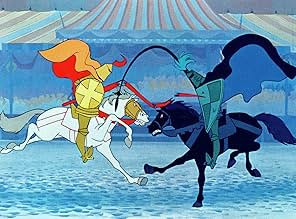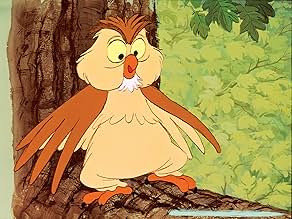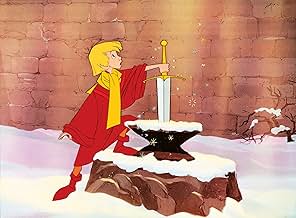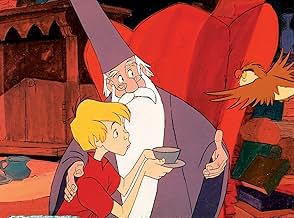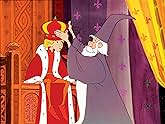A poor boy named Arthur learns the power of love, kindness, knowledge and bravery with the help of a wizard called Merlin in the path to become one of the most beloved kings in English histo... Read allA poor boy named Arthur learns the power of love, kindness, knowledge and bravery with the help of a wizard called Merlin in the path to become one of the most beloved kings in English history.A poor boy named Arthur learns the power of love, kindness, knowledge and bravery with the help of a wizard called Merlin in the path to become one of the most beloved kings in English history.
- Nominated for 1 Oscar
- 1 win & 1 nomination total
Rickie Sorensen
- Wart
- (voice)
Sebastian Cabot
- Sir Ector
- (voice)
- …
Karl Swenson
- Merlin
- (voice)
Junius Matthews
- Archimedes
- (voice)
Martha Wentworth
- Madam Mim
- (voice)
- …
Norman Alden
- Sir Kay
- (voice)
Alan Napier
- Sir Pellinore
- (voice)
Richard Reitherman
- Wart
- (voice)
Robert Reitherman
- Wart
- (voice)
Jack Albertson
- Knight in Crowd #1
- (uncredited)
Barbara Jo Allen
- Scullery Maid
- (voice)
- (uncredited)
Fred Darian
- The Minstrel in opening sequence
- (voice)
- (uncredited)
James MacDonald
- The Wolf
- (voice)
- (uncredited)
- …
Tudor Owen
- Knight in Crowd
- (voice)
- (uncredited)
Thurl Ravenscroft
- Black Bart
- (voice)
- (uncredited)
- Directors
- Writers
- All cast & crew
- Production, box office & more at IMDbPro
Storyline
Did you know
- TriviaAlthough Walt Disney never knew it, he himself was character designer Bill Peet's model for Merlin. Peet saw them both as argumentative, cantankerous, but playful and very intelligent. Peet also gave Merlin Walt's nose. This was the second instance in which Walt unknowingly served as model for a wizard, the first being the wizard Yensid from the Sorcerer's Apprentice in Fantasia (1940). This explains why the character was given the name Yensid. This read backwards is Disney.
- GoofsThroughout the entire film Wart's voice keeps on changing from being child-like to adult-like. One of the easiest spots to notice this is in the throne room towards the end when Wart is trying to get somebody else to take his place. He says "Oh Archimedes, I wish Merlin were here!" in his adult voice, then the camera goes to a distant view and he calls "Merlin, Merlin" in his child voice.
- Alternate versionsThe UK DVD version omits part of Madam Mim's first line "Sounds like someone's sick. How lovely. I do hope it's serious. Something dreadful." She now says "Sounds like someone's sick. How lovely."
- ConnectionsEdited into The Jungle Book (1967)
- SoundtracksThe Legend of the Sword in the Stone
(1963) (uncredited)
Music and Lyrics by Richard M. Sherman and Robert B. Sherman
Sung by Fred Darian
Featured review
This movie is another proof of the high quality of the classic Disney films. Today feature films are quite funny too... but they based mostly on simple, crude jokes and spoofing of other topical movies (remember the bullet time-spoof in "Shrek"). There is no substance to think about in it. You can see them, laughing about them...and forgot them almost completely a few years later. Who will remember, i.e., "Ice Age" or "Madagascar" in 40, 50 or 60 years? The old Disney classics are different, there are timeless! "The Sword in the Stone" contains a lot of joyful gags too, but no gag stands above the characters, no joke was made only to fill a hole in the plot. The story, the plot, and the characters are primary. And Disney add not only joyful gags. As Walt himself once said: "For every laugh, there should be a tear." Disney take children always quite seriously, and a lot of his early films contains a lesson for life, sometimes the lesson can be very sad and cruel, like in "Bambi", sometimes lesser sad, like in "The Sword in the Stone"... but can anybody forget the cute little girl squirrel, that was left by Wart, desperately crying and with a broken heart? And Merlin's closing words about love: "Well, yes, in its own way... yes, I'd say it's the most powerful force on Earth"!
This is one of the main ingredient of the famous Disney Magic: Joy and tragedy! Another is the art of hand drawn animation. The quality of the animation went downwards at Disney after WW-II too, slowly, but surely. But in 1963 cel-animation was still on a high level. Not so good as in the golden Era, when "Fantasia", "Pinocchio" or especially "Bambi" set the utmost high standards of perfectionism, but quite better than in "Hercules", "The Lion King" or "The Rescuers down under". 7 of 10 stars for "The Sword in the Stone"! It is not the best of all Disney films, but quite better and deeper than the most of the modern CGI movies!
This is one of the main ingredient of the famous Disney Magic: Joy and tragedy! Another is the art of hand drawn animation. The quality of the animation went downwards at Disney after WW-II too, slowly, but surely. But in 1963 cel-animation was still on a high level. Not so good as in the golden Era, when "Fantasia", "Pinocchio" or especially "Bambi" set the utmost high standards of perfectionism, but quite better than in "Hercules", "The Lion King" or "The Rescuers down under". 7 of 10 stars for "The Sword in the Stone"! It is not the best of all Disney films, but quite better and deeper than the most of the modern CGI movies!
Details
- Release date
- Country of origin
- Official site
- Language
- Also known as
- Die Hexe und der Zauberer
- Production companies
- See more company credits at IMDbPro
Box office
- Budget
- $3,000,000 (estimated)
- Gross US & Canada
- $12,000,000
- Opening weekend US & Canada
- $2,230,614
- Mar 27, 1983
- Gross worldwide
- $12,000,000
- Runtime1 hour 19 minutes
- Aspect ratio
- 1.37 : 1(original & negative ratio, open matte)
Contribute to this page
Suggest an edit or add missing content

Top Gap
By what name was The Sword in the Stone (1963) officially released in India in English?
Answer






